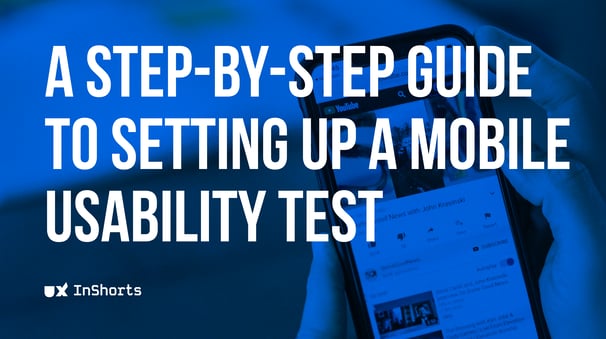A Step-by-Step Guide to Setting Up a Mobile Usability Test
Conducting a mobile usability test requires meticulous planning and preparation to ensure the process runs smoothly and generates valuable insights. Here’s a detailed guide on how to set up and execute an effective mobile usability test.
BLOGUX DESIGN
7/22/20242 min read


Preparing for the Test
Define and Print Tasks
Printed Tasks: Prepare and print out the tasks for your participants. This helps them refer back to the task during the session, ensuring clarity and consistency. It's also useful for you to keep track of which task they are working on, especially if you’re recording.
Read Aloud: Ask participants to read the tasks aloud to confirm their understanding.
Secure Consent and Payment Forms
Consent Forms: Make sure participants read and sign consent forms before starting the test, especially if you plan to record the session.
Payment Forms: Prepare and manage the payment forms for participants, which adds professionalism and compensates them for their time.
Introduce the Think Aloud Protocol
Warm-Up: Print and have participants read the Think Aloud Protocol. This primes them to think aloud during the session, which is crucial for gathering insights into their thought processes.
Setting Up the Recording Environment
Install and Position the Document Camera
Setup: Use a document camera to record the mobile session. Position it on the table and connect it to your computer, ensuring the corresponding software is running to view and record the user’s device screen.
Use Screen Recording Software
Software: Run screen recording software on your computer to capture the user’s mobile screen. This will help you analyze the interaction later.
Create a Marked Area for Consistency
Tape Boundary: Use tape to create a boundary on the table where participants should place their device. This keeps the device within the camera’s view and ensures consistent recording.
Demonstrate the Setup to Participants
Practice Run: Show participants how to use their device within the marked area. Allow them to practice with a simple task, such as finding an article online, to get comfortable with the setup.
Ensure Clear Audio Recording
Microphone: Use your computer’s microphone or a separate microphone to record audio during the session. Clear audio is essential for understanding participant feedback and thoughts.
Creating a Comfortable Testing Environment
Provide a Comfortable Chair
Participant’s Chair: Offer a comfortable chair for the participant, preferably one without wheels, to prevent unnecessary movement or fidgeting during the test.
Conduct Pre-Test Checks
Software Test: Ensure all software is up and running before the participant arrives. Perform a test run to confirm everything is functioning properly, avoiding any technical issues during the actual test.
Executing the Test
Start the Session Smoothly
Begin the Session: Once everything is set up, start the session. Monitor the participant’s interaction with the device, ensuring they stay within the marked area and think aloud as they perform the tasks.
Observe and Record: Pay close attention to how the participant navigates the tasks, noting any difficulties or points of confusion.
Wrap Up and Gather Feedback
Feedback: After the session, gather feedback from the participant about their experience. This can provide additional insights into any issues they encountered.
Thank You and Payment: Thank the participant for their time and provide the agreed payment.
Conclusion
By following these steps, you can set up a mobile usability test that provides valuable insights into user behavior and interaction with your mobile application. Proper preparation and attention to detail ensure the process runs smoothly, yielding useful data to improve the user experience.
UX Inshorts was born out of a passion for making UX knowledge accessible and engaging. We understand that in the fast-paced world of design, staying updated with the latest trends, tools, and best practices can be challenging. That's why we focus on delivering bite-sized content that fits seamlessly into your busy schedule.
Quick Links
Subscribe to UX Inshorts
Follow Us
